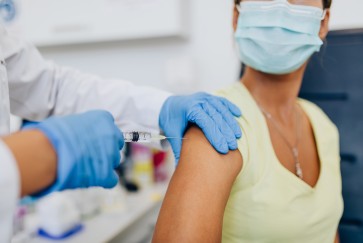The National Institutes of Health (NIH) has selected Northwestern University to participate in a national research study investigating COVID-19 infection and virus transmission after vaccination, the University announced today.
The study, currently enrolling undergraduate students between the ages of 18 and 26, will assess the effectiveness of Moderna’s COVID-19 vaccine to prevent virus transmission. Study results are expected to be published later this year and will be used to guide public health policy in the next phase of the pandemic, as more individuals become vaccinated.
We know the vaccines are effective at preventing serious COVID-19 illness, and our next step is to understand whether they prevent vaccinated individuals from transmitting the virus to others.”
Lead investigator for Northwestern PreventCOVIDU study
“We are grateful to be included in this global effort to better understand how we can safely return to normal as the pandemic evolves,” said vice president for operations Luke Figora, who has led Northwestern’s COVID-19 response since the start of the pandemic. “We encourage any student who is able to look into this study and consider participating in this research, for the benefit of individuals around the world.”
Northwestern is one of 22 universities participating in the PreventCOVIDU study, hosted by the COVID-19 Prevention Network, which was formed by the National Institute of Allergy and Infectious Diseases (NIAID) at the NIH to respond to the global pandemic.
Northwestern was selected as a study site, in part, because of demonstrated ability to navigate complex study protocols around COVID-19 testing, vaccination and healthcare infrastructure. Selection also was based on strong experience in COVID-19 research and the close relationship with Northwestern Medicine.

“We know the vaccines are effective at preventing serious COVID-19 illness, and our next step is to understand whether they prevent vaccinated individuals from transmitting the virus to others,” said Dr. Karen Krueger, an infectious disease expert at Northwestern University Feinberg School of Medicine and Northwestern Medicine. “College students are a prime audience to test this question, based on social behavior and previously known disease transmission rates.”
Krueger is the lead investigator in Northwestern’s PreventCOVIDU study.
An anticipated 12,000 students from participating universities will take part in the 5-month study. About half of study participants will receive a vaccine at the start of the study, while the other half will receive it by July. Participants will be required to answer daily questionnaires, perform daily nasal swabs and then return test kits to study staff, while also continuing to participate in Northwestern’s testing program.
In order to better study transmission, each study participant will be asked to identify close contacts who also will be invited to take part in the study. They will be asked to answer weekly questionnaires for one month and may be asked to provide blood samples and nasal swabs for two weeks.
This is yet another opportunity for Northwestern to aid the global fight against COVID-19.”
Vice president for operations
All participants will be compensated for study participation — up to $1,000 for those who participate in the 5-month study.
“Throughout the pandemic, our faculty and students have contributed invaluable insights and research into the virus,” Figora said. “This is yet another opportunity for Northwestern to aid the global fight against COVID-19.”
Students who have previously been diagnosed with COVID-19 or who have already received a vaccination are not eligible to participate in the study. To learn more and to volunteer as a study participant, visit PreventCOVID.org.
Northwestern encourages all members of the campus community to receive vaccines as soon as they are available to them. Find updated information about vaccination plans on our COVID-19 and Campus Updates website.

